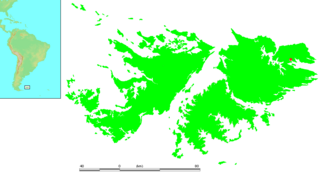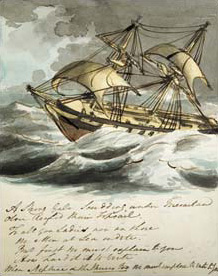
The history of the Falkland Islands goes back at least five hundred years, with active exploration and colonisation only taking place in the 18th century. Nonetheless, the Falkland Islands have been a matter of controversy, as they have been claimed by the French, British, Spaniards and Argentines at various points.

East Falkland is the largest island of the Falklands in the South Atlantic, having an area of 6,605 km2 or 54% of the total area of the Falklands. The island consists of two main land masses, of which the more southerly is known as Lafonia; it is joined by a narrow isthmus where the settlement of Goose Green is located, and it was the scene of the Battle of Goose Green during the Falklands War.

Port Louis is a settlement on northeastern East Falkland. It was established by Louis de Bougainville on 5 April 1764 as the first French settlement on the islands, but was then transferred to Spain in 1767 and renamed Puerto Soledad.
Silas M. Duncan was an officer in the United States Navy during the War of 1812.
The pound is the currency of the Falkland Islands, a British Overseas Territory in the South Atlantic Ocean. The symbol is the pound sign, £. The ISO 4217 currency code is FKP.

The governor of the Falkland Islands is the representative of the British Crown in the Falkland Islands, acting "in His Majesty's name and on His Majesty's behalf" as the islands' de facto head of state in the absence of the British monarch. The role and powers of the governor are set out in Chapter II of the Falkland Islands Constitution. The governor in office resides at Government House, which serves as the official residence.

In December 1832, two naval vessels were sent by the United Kingdom to re-assert British sovereignty over the Falkland Islands, after the United Provinces of the Rio de la Plata ignored British diplomatic protests over the appointment of Luis Vernet as governor of the Falkland Islands and a dispute over fishing rights.
Sovereignty over the Falkland Islands is disputed by Argentina and the United Kingdom. The British claim to sovereignty dates from 1690, when they made the first recorded landing on the islands, and the United Kingdom has exercised de facto sovereignty over the archipelago almost continuously since 1833. Argentina has long disputed this claim, having been in control of the islands for a few years prior to 1833. The dispute escalated in 1982, when Argentina invaded the islands, precipitating the Falklands War.

Luis Vernet was a merchant from Hamburg of Huguenot descent. Vernet established a settlement on East Falkland in 1828, after first seeking approval from both the British and Argentine authorities. As such, Vernet is a controversial figure in the history of the Falkland Islands sovereignty dispute.

Puerto Soledad was a Spanish military outpost and penal colony on the Falkland Islands, situated at an inner cove of Berkeley Sound.

The Falkland Islands is an archipelago in the South Atlantic Ocean on the Patagonian Shelf. The principal islands are about 300 mi (480 km) east of South America's southern Patagonian coast and about 752 mi (1,210 km) from Cape Dubouzet at the northern tip of the Antarctic Peninsula, at a latitude of about 52°S. The archipelago, with an area of 4,700 sq mi (12,000 km2), comprises East Falkland, West Falkland, and 776 smaller islands. As a British overseas territory, the Falklands have internal self-governance, but the United Kingdom takes responsibility for their defence and foreign affairs. The capital and largest settlement is Stanley on East Falkland.

Falkland Islanders derive from various origins. Earliest among these are the numerically small but internationally diverse early 19th century inhabitants of the Falkland Islands, comprising and descended in part from settlers brought by Luis Vernet, and English and American sealers; South American gauchos who settled in the 1840s and 1850s; and since the late 1830s, settlers largely from Britain with a minority from other European countries. There has also been significant recent contributions from Saint Helena and Chile.

The Falkland Islands have a complex history stretching over five hundred years. Active exploration and colonisation began in the 18th century but a self-supporting colony was not established till the latter part of the 19th century. Nonetheless, the islands have been a matter of controversy, as due to their strategic position in the 18th century their sovereignty was claimed by the French, Spaniards, British and Argentines at various points.
Antonio "El Gaucho" Rivero was a gaucho known for his leading role in the Port Louis Murders of 26 August 1833, in which five prominent members of the settlement of Port Louis on the Falkland Islands were murdered. In Argentine revisionist historiography and public consciousness, Rivero is viewed as a patriotic hero who rebelled against British authority. However, academic historians both in Argentina and abroad agree that Rivero's actions were not motivated by patriotism, but by disputes over pay and working conditions with the representatives of Louis Vernet, the former Argentine Political and Military Commander of the islands.
William Dickson, born Dublin, Ireland was an Irish-born settler in Port Louis in the Falkland Islands during a pivotal time in its history. He was hired by Luis Vernet as Port Louis storekeeper. Following the removal of the Argentine administration, Dickson was given into custody the British flag. Dickson wrote a diary where he documented the life in Port Louis shortly after the British landing. He became one of the victims of the Gaucho Murders, on 26 August 1833.

The Falklands Expedition occurred in late 1831 when the United States Navy warship USS Lexington was dispatched to investigate the seizure of three whalers at the settlement of Puerto Luis founded in the ruins of the former Spanish penal colony of Puerto Soledad by Luis Vernet. Vernet had sought to control sealing in the islands and seized the ships alleging they had violated his regulations controlling sealing in the islands. Finding one of the ships being outfitted with guns, Captain Duncan seized six of the senior officers in the settlement on charges of piracy. The damage done to the settlement is disputed. Duncan reports spiking the guns of the settlement and a powder store. Vernet was to later claim his settlement was ransacked.
Matthew Brisbane was a Scottish mariner, sealer and notable figure in the early history of the Falkland Islands.
Esteban Mestivier served as the Argentine Military and Civil commander in the Falkland Islands for a brief period in 1832. His appointment to the role was gazetted in the British and Argentine Packet News in September 1832. The announcement led to the British consul issuing a note of protest, which other than a brief acknowledgement from Argentina went unanswered. This combined with the USS Lexington raid of 1831, is considered to have prompted the British to send a small naval patrol to re-assert British sovereignty in the Falkland Islands.
Antonina Roxa was one of the first Falkland Islanders whose residence in the islands predated the British return in 1833. Roxa first travelled to the islands in 1830 and was part of Luis Vernet's original colony. After the British return she became a landowner and businesswoman. She died of cancer in 1869.

José María Pinedo was a commander in the navy of the United Provinces of the River Plate, one of the precursor states of what is now known as Argentina. He took part in the Argentine War of Independence, the Argentine Civil Wars and the Cisplatine War. He is also known for failing to resist the British return to the Falkland Islands in 1833.












